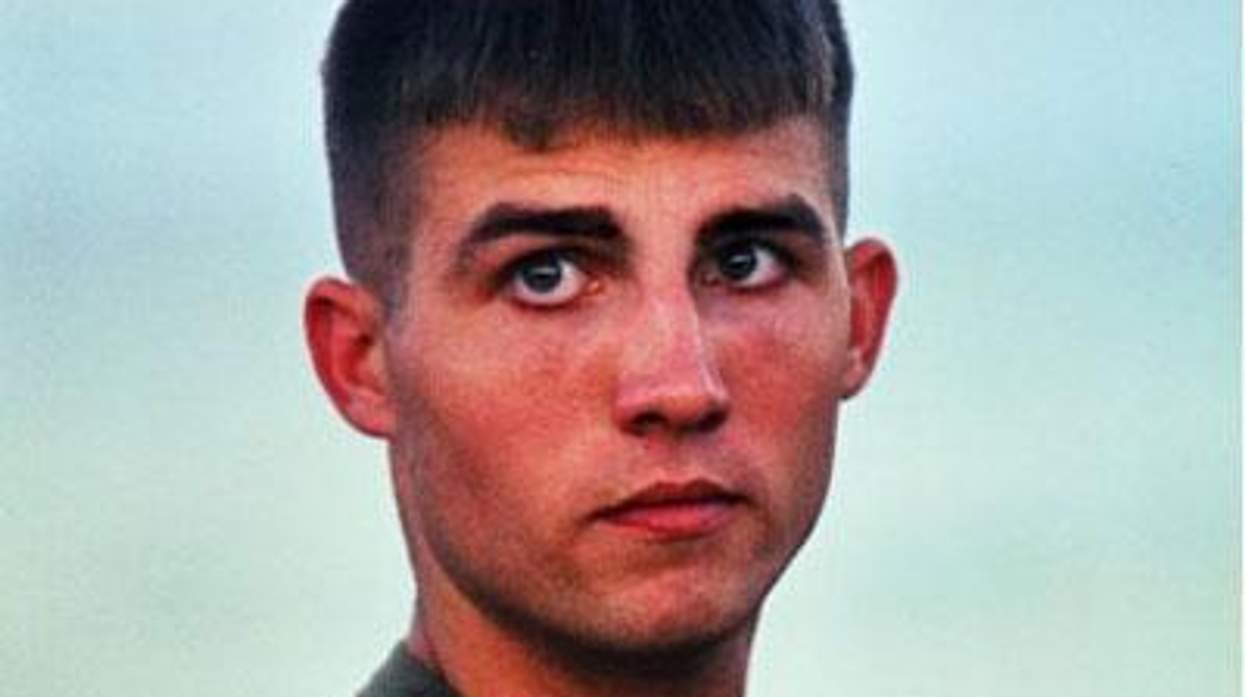There's a lot more crying in the Marines than you'd expect from the fetishized image packaged for pop-consumption. In fact, the first thing you do as a Marine is cry. The end of boot camp includes a grueling 54-hour test of your physical, mental, and cooperative abilities culminating in a ceremony where your first Eagle Globe and Anchor (the symbol of our beloved Corps) is placed in your hand. The crying isn't just for the artifact in your palm but also seeing your drill instructor smile, address you with respect, and call you a Marine.
If that doesn't get you, Lee Greenwood blaring over the loudspeakers certainly will.
Much of a Marine's world is hidden from civilians. Our culture from our clothing to our language is our own. We are a familial pack with fierce loyalties and fiercer love. So much love in fact, that crying is unavoidable. Imagine if you will, that your brother or sister at any moment would actually lay down their life for you, then multiply that by thousands of brothers and sisters. But it isn't only the eminence of danger that stresses you, but also the drama that comes with family.
My service as a Russian linguist in the Marines ended in 2002, but my experience as a Marine is a story without end. I meet new members of my extended family every day and, from time to time, I encounter some I knew quite well in unexpected places. We talk about our family drama and wax about what was. It never gets old, even as I slowly do.
Two years ago, on a Sunday morning, I woke up and began fumbling through my Facebook mailbox. There, under the "other" box, was a message from a corporal I hadn't seen since my tour of duty had ended. The message was long, but one sentence conveyed all the intended meaning: "I'm sorry I didn't try harder to stick up for you." Again, the tears.
You see, this Marine and I were quite close. We'd gone out on the town clubbing, sat on E-tools eating MRE's in the black of night, and we'd traded jabs in the barracks about newbies trying to pass off jokes as anecdotes for attention. In his letter, he detailed how not standing up for me when discussions got nasty was, in his words, the "greatest regret of his five years in Marines." People didn't know for sure I was gay, but most suspected it.
The irony of "don't ask, don't tell" was that not telling was itself a giveaway. As a gay Marine, life in the corps was often difficult for me. I like to think I hid it well with smiles and overachievement, but when you know someone well enough, you can always tell when something is wrong.
It was my friendships with Marines like this corporal that kept me alive, kept me going. But, the one thing we never shared was my constant fear of being kicked out or of being killed by one of my own. That I endured on my own. After a few incidents with my Recon company, I even went so far as to move off base because of fear for my safety. It's an unsettling feeling to be afraid of your own family.
I took half a day to collect myself before sending the corporal from my past a friend request and trying to compose a response. The response, I'll admit, was fumbled and half dismissive.
Today, the paper walls that separated Marines from one another have been shredded. A deep part of me aches to know the freedom to love my fellow Marines with unedited trust. "Were that I could do it again," is a sentiment common in nearly all Marine vets. I chose to join the Marines for too many reasons to count, but being gay was never part of the equation. For the most part, I didn't even know I was gay, or rather, I hadn't admitted it to myself. The reasons why I didn't reenlist are a much shorter list. At the top was DADT.
Once I came out to me, the military stopped being a place I could continue to learn about myself. It became something that was stopping me from knowing that person.
A year after repeal, I can't help but be caught up in the fantasy of it. Over and over I've relived every detail back to the white buses, yellow footprints, quarterdecks, and campaign covers. I've rewritten the story of my service with me bringing a "real" date to the Marine Corps Ball or for "mando-fun." I've relived conversations free of pronoun games. I've imagined actually going on dates instead of having rendezvous.
There's nothing like the Corp's culture of "hurry up and wait," "good to go," and in which everyone answers "How are you?" with "Outstanding!" To all current service members, I envy the freedom you have on your journey. But to the corporal who wrote me that Sunday morning, if you allow me to say it all over again, I'd say it differently. I'd say:
"I'm sorry that what I went through hurt you. And, I'm sorry that I couldn't share with you the details of the hardship I faced. Sometimes, I was scared. Sometimes, I worked so hard not because I wanted to prove what I could do, but because I was afraid I'd lose everything if I didn't. I wanted very much to trust you with more. It's a sad thing when brothers have to love one another through walls. Please, don't ever think that my lack of disclosure represents any lack of love for you. I miss you."
BRETT EDWARD STOUT is a veteran corporal in the U.S. Marine Corps. He is the founder of the Gay Marines Facebook page and is a contributing writer toThe Advocate.




































































Charlie Kirk DID say stoning gay people was the 'perfect law' — and these other heinous quotes